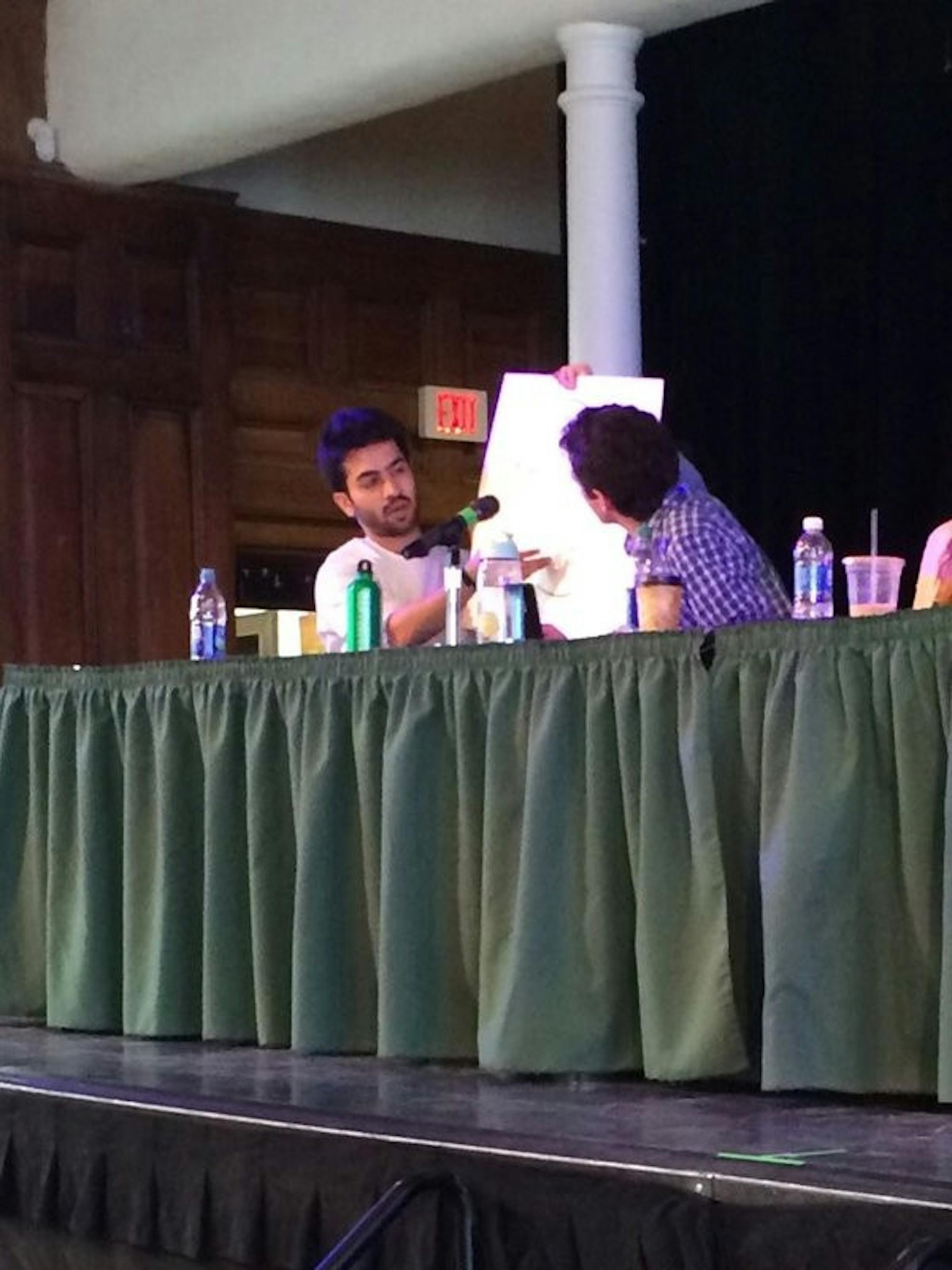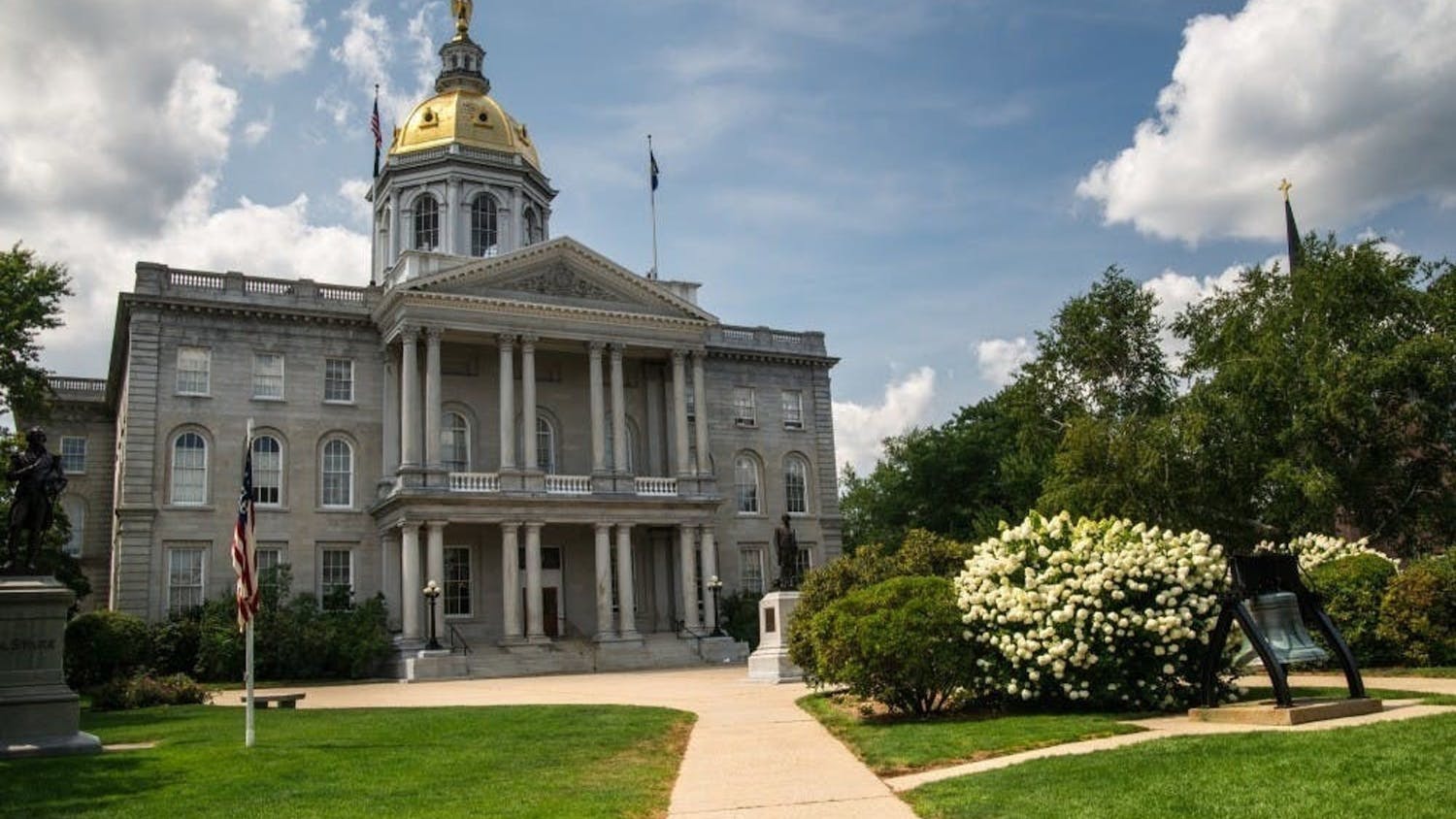The second Student Assembly debate this afternoon largely focused on the role of the Assembly on campus, its budget, inclusivity, student body apathy towards the governing body and the details of the “Moving Dartmouth Forward” policy initiative. Six Assembly presidential candidates and four vice presidential candidates participated.
Of the around 40 students who attended the event, approximately 20 remained to hear the candiates’ closing remarks.
Shiv Sethi ’17, Sean Cann ’17, Nick Harrington ’17, Aaron Cheese ’18 and Joby Bernstein ’17 are running for this year’s presidential candidates. Nathan Busam ’17, Sally Portman ’17, Menaka Reddy ’18 and Timo Vaimann ’17 are vying for the position of vice president, running on a ticket with Cann, Harrington, Cheese and Bernstein, respectively. The tickets, however, are ceremonial, and voters will pick the president and the vice president separately.
Packer withdrew his candidacy following the debate, Elections Planning and Advisory Committee chair Derek Whang ‘17 said. Packer said that he was in the race solely to participate in the Assembly debates. He told audience members to not vote for him.
The event was hosted by The Dartmouth and moderated by managing editor Sara McGahan. The debate was the second and final debate before voting opens tomorrow at 8 p.m. and closes the following day at 8 p.m.
All candidates were critical of the Assembly in its current. Harrington said the Assembly should play a bigger role on campus this year than in the past. He and Portman referred to a proposal to restructure the Assembly — eliminating appointed positions and moving towards greater representation across campus groups such as housing communities.
Cann said that the Assembly’s accomplishments do match up to its institutional history.
“You’re going to hear a lot of lofty words thrown around and hear a lot about an organization that has a long history and has accomplished very little,” Cann said.
Cann says his platform focuses on “highly specific goals” — many of which focus on small, quality-of-life improvements such as softer toilet paper and standing desks. He repeatedly said his initiatives would be driven by data from future student surveys.
Sethi objected to Cann’s suggested allocation of funds, arguing that the Assembly’s job is to encourage conversation and create communities.
Cann defended himself, explaining that the toilet paper would be purchased with “extra money” within the Assembly’s $44,000 budget.
“Although softer toilet paper is great, it’s an idea that represents what we’re going for, it’s not our whole [platform],” he said.
If elected, Cann plans for funds to first be put towards the Assembly’s mental health initiative and the “take your professor to lunch” program. He also noted that the Assembly can meet most student needs through targeted advocacy rather than spending funds. Cann brought in a poster with his proposed budget to illustrate his point.
In recent years, the Assembly has been criticized for inefficacy. Reddy said that this perception stems from the Assembly’s past promises to make changes that it does not have the power to implement.
“Students’ perception of Student Assembly is fairly realistic. They’re frustrated and apathetic about what SA does,” Cann said.
The biggest misperception about the Assembly is that it functions to transmit student opinions to the administration, Packer said. When the administration would like student responses, they create alternative channels by which to do so, he said.
Harrington objected to the idea that the Assembly does not accomplish anything meaningful. He provided three examples of major initiatives driven by the Assembly: making course evaluations available to students, establishing the “I’m Here for You” mental health awareness campaign and drafting a student bill of rights. The Assembly should continue work on these projects, but more needs to happen, he added.
Candidates proceeded to address recent policies implemented by the administration.
Packer cited the Student and Presidential Committee on Sexual Assault’s recommendation to make Greek houses gender-inclusive as a means to combat sexual violence on campus. Given that SPCSA works closely with the administration to develop its proposals, Packer argued that the College should take steps to implement this recommendation.
Bernstein criticized the administration for not appropriately evaluating the effect of the hard alcohol ban, while Sethi said that banning hard alcohol has not been proven to be helpful in changing drinking patterns. Sethi added that he appreciates the College’s committed effort to attract diverse faculty – particularly queer individuals and those of color – to campus.
The derecognition of Greek houses on campus has resulted in other Greek organizations becoming more exclusive and increasing their dues, Vaimann, said. Providing financial aid for affiliated students should be the responsibility of the College, not individual houses, he said.
Portman praised the implementation of the six housing communities, which she said will add a new dimension to Dartmouth’s social life. She also said that the administration needs to be more transparent on what its expectations are of the Greek community and how it can continue to have a positive impact on campus.
Moving Dartmouth Forward has done a lot to encourage greater faculty presence in students’ lives, Reddy said.
Most candidates agreed that socioeconomic disparities, the elimination of the need-blind financial aid policy for international students and the prevalence of sexual assault are pressing problems.
Reddy said structural inequities, particularly those regarding race and class, are the two biggest problems on campus. Socioeconomic divides, such as the fact that some students need financial assistance just to buy a winter coat, are often ignored, she said.
Reddy recommended delegating funds directly to specialized organizations.
“Who understands the issues that men of color on campus face better than the Men of Color Alliance?” she asked.
Packer said that the College faces the same structural problems today as it did when it first became coeducational, or when it first admitted students of color.
The removal of need-blind financial aid for international students, Vaimann said, is of serious concern. Vaimann, who is from Estonia, said he would not be at the College today were it not for the now-discontinued policy.
Sethi said that while he agrees that differentiating between the finances of domestic and international students is wrong, the Assembly has little power to change this policy and planning to do so is unrealistic and likely to lead to disappointment.
The power to alter financial aid policies does not rest within the Assembly, Packer said, pointing toward student activism as a more effective means of making change.
Bernstein added that even with a diverse campus, students have to work to eliminate “hunkering down,” the process by which people spend more time with those from similar backgrounds. Harrington concurred, saying that it is easy to focus on one’s individual experience at Dartmouth.
Candidates debated the donation of the Assembly’s funds to the local community, one of the proposals raised by Bernstein and Vaimann. Audience member and current Assembly chief of staff Noah Manning ’17 stood up to explain that contributing Assembly funds to those outside of the College is against the Undergraduate Finance Committee’s regulations.
Bernstein clarified that when he talked about donating funds to the Upper Valley community, he was also referring to the more than 4,000 Dartmouth students in need of assistance. He also said that he would be willing to amend the current rules.
Sethi cautioned that the Assembly’s funds are not “dropped from the heavens,” and that the money should be solely used to benefit Dartmouth students.
The presidential and vice presidential candidates fielded a number of questions from the audience. Spencer Blair ’17 asked the candidates to each specify a concrete policy change related to sexual assault that they would like to see implemented at the College.
Sethi recommended allowing Green Team sober monitors into smaller, more casual gatherings at fraternities. Busam called for greater educational programming to help students better deal with uncomfortable social situations. Portman said she believed the Assembly should support the goals of SPCSA, which include shifting the social norms of bystander intervention, increasing focus on proactive consent and providing resources and support services to victims.
Bernstein argued that sexual assault cases should always go through court procedures rather than the College’s internal adjudication process.
Sexual assault is a crime and should be treated as such, Bernstein said.
Reddy recommended allocating Assembly funds to SPCSA and organizations like Native Americans at Dartmouth. Almost 50 percent of Native American women will be assaulted during their time here, compared to about 30 percent of all undergraduate women, she said. Together, SPCSA and NAD could work to mitigate the problem of sexual violence, Reddy added.
The winners of the presidential and vice presidential race as well as the other races will be announced after voting closes on Sunday.
Candidates for 2017 Class Council president are Dillon Rich ’17 and Elisabeth Schricker ’17, while vice presidential candidates are Abena Frempong ’17 and Andrew Goldfarb ’17. Hanting Guo ’19, Josephine Kalshoven ’19 and Danny Li ’19 are running for 2019 Class Council, and Toriyama Asam ’18 is the only candidate for 2018 Class Council.
Running for the Committee on Standards and Organizational Adjudication Committee are Morgan Corley ’18, Oliver Edelson ’18, Daniel Lee ’17 and Ian Whitney ’18.
This debate followed Thurday’s debate moderated by the Greek Leadership Council on Greek life.




